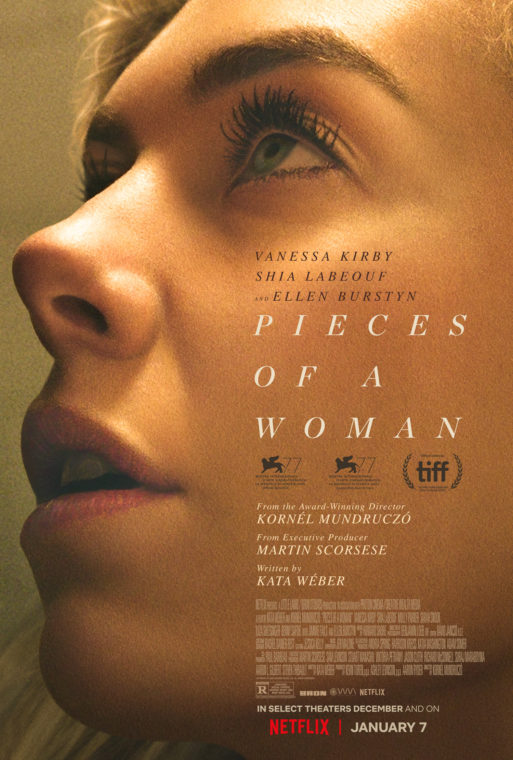
Credit: IMDB
“Pieces of a Woman” is a movie on Netflix about a young couple who lose a baby in childbirth, and the aftermath of their grief. While the title suggests a story that centers on Martha, the mother, the film is as much about her husband Sean and the very different paths they take to emerge from their suffering.
The first 30 minutes of the film evoke an almost unbearable dread. As viewers, we know the tragedy that looms ahead for Martha and Sean as they work through the agony and excitement of childbirth. The opening scene, filmed in a single continuous take, drags us toward the inevitable with a slowness that borders on sadistic.
After their newborn, Yvette, dies in a home birth gone wrong, the two parents descend into private spirals of grief. Sean struggles to make sense of what happened, craving closeness and closure, while Martha moves further into isolation. With their needs at odds, the relationship begins to fragment.

Vanessa Kirby and Shia LeBeouf share an emotional moment in “Pieces of a Woman.”
Vanessa Kirby is stunningly effective as Martha, who moves through her grief with a mixture of eerie grace and quiet desperation. Kirby researched the role extensively, enrolling in antenatal classes and even witnessing a live birth. Shia LeBeouf plays Sean as her rough but sensitive foil, his grief hardening into rage when he can’t get through to her. It’s a convincing performance that’s difficult to watch at times — especially in light of the abuse allegations against LeBeouf that came out after the movie was filmed.
The two characters’ pain is played out both through high drama — shouting, betrayal, tears — and mundane details, like the misspelling of their daughter’s name on a sample grave marker. We see Martha struggle with the physical aftermath of childbirth, weather the well-meaning intrusions of strangers in the grocery store, and argue with Sean over what to do with the baby room.
The realness of these details may have come from personal experience. Writer Kata Wéber drew from her own tragic loss when writing the film: She and her husband, director Kornél Mundroczó, lost a baby during pregnancy. Wéber found solace in writing about her experience, shocking even her husband with the rawness of her script. The Hungarian filmmakers decided to make the film in English to reach a wider audience, believing — rightly — that the often-taboo subject matter could resonate with bereaved parents around the world.
“Pieces of a Woman” tells the story of unimaginable loss with emphatic honesty, though it loses its tone somewhat in the film’s too-tidy conclusion. Stories demand closure, which is something grief doesn’t always afford — at least not in a single dramatic climax. Still, the film brings to life an experience suffered by many parents around the world and yet rarely talked about, even behind closed doors.
Whether or not you’ve lost a child, “Pieces of a Woman” has the potential to be both cathartic and triggering. If you can handle the intense emotions it deals out, the film is a beautiful and brutally honest look at the consequences of all-consuming grief.

 “Pieces of a Woman” directed by Kornél Mundroczó
“Pieces of a Woman” directed by Kornél Mundroczó


 National Donate Life Month Reminds Us To Give
National Donate Life Month Reminds Us To Give
 How Dare You Die Now!
How Dare You Die Now!
 Debating Medical Aid in Dying
Debating Medical Aid in Dying














